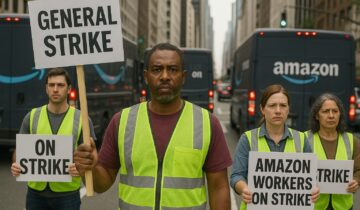Coordinated Individual Non-Participation is The Primary Form of a General Strike.
A mass movement of coordinated individual non-participation refers to a collective effort where many people choose to deliberately abstain from certain activities, events, or systems in a coordinated manner. This can serve as a means of protest, resistance, or to draw attention to a specific cause or issue. This collective action or non-participation functions much like a general strike.
In this scenario, each person chooses not to participate, but a common goal unites their actions. Unlike a traditional protest where people might gather or demonstrate, this type of movement depends on the collective power of non-participation—such as boycotts, strikes, or social media campaigns—where the lack of involvement sends a message of discontent or demands change.
The effectiveness of this type of movement comes from the large number of people participating, which makes it hard for the targeted system or institution to operate normally and can lead to political, social, or economic pressure. Coordinated individual non-participation—whether targeting a specific company, industry, or the economy as a whole—requires deliberate and strategic actions. Although individual non-participation may seem small on its own, when well-organized, it can send a strong message and put significant pressure for change.
Here are some actions individuals can take:
Boycott Specific Products or Services
Selective Consumer Choices: Individuals can opt not to purchase goods or services from a particular company. For example, consumers might avoid products from a company known for unethical labor practices, environmental harm, or unfair pricing.
Publicize the Boycott: Raise awareness about the boycott through social media, word of mouth, or flyers. The aim is to build momentum and encourage others to stop supporting the company as well.
Withdraw from Labor or Commercial Transactions
Strike (or Partial Strike): Workers may refuse to perform certain job activities or stop working entirely. This could include not showing up for work, declining to do specific tasks, or lowering productivity.
Disrupt Supply Chains: Those in industries where they can influence supply chains (e.g., transportation, logistics, or retail) can disrupt the flow of goods to harm the targeted company’s economic standing without confrontation.
Divestment
Withdraw Investments: Individuals can sell stocks or investments related to the targeted company or industry, thereby applying financial pressure on them. This may also include divesting from specific sectors, such as fossil fuels, if the goal is to change corporate behavior.
Encourage Others to Divest: Working with others to divest as a group amplifies financial pressure on a company or industry, showing broad discontent.
Reduce Economic Activity (General Strike)
Work Stoppage: Coordinated non-participation in the economy could involve going on strike or collectively reducing work participation for a set period (even one day) to disrupt economic activity.
Avoid Buying Goods and Services: Promote widespread participation in reducing consumption for a day or longer, such as “buy nothing” days or weeks, where individuals intentionally lower their economic footprint.
Public Shaming and Awareness Campaigns
Social Media Campaigns: Use platforms like Twitter, Instagram, or TikTok to raise awareness, motivate others to boycott, and hold companies responsible. Hashtags, viral content, or informational posts can attract attention to a cause.
Petitions and Open Letters: Draft petitions or open letters that individuals can sign to publicly show their non-participation and demands.
Digital and Physical Signage: People can put up stickers, posters, or digital banners in public spaces (with permission) to raise awareness about the target company’s unethical practices.
Coordinated Refusal to Pay Fees/Subscriptions
Stop Paying for Services: If targeting a company that depends on subscriptions (such as Netflix, gyms, or utility providers), individuals can collectively choose to cancel their subscriptions to send a financial message.
Refusing to pay bills or fees: When a company or institution exploits consumers or workers, a widespread refusal to pay bills can serve as a form of economic resistance.
Refuse to Support Political Donations or Lobbying Efforts
Revoke Financial Support: Individuals can pledge to cease donating to political candidates, lobbying groups, or causes that back companies or industries causing harm.
Create a public pledge encouraging others to withhold financial support from these political entities or organizations.
Reduce Consumerism and Buy from Ethical Alternatives
Conscious Consumerism: Shift purchasing power to ethical businesses, local enterprises, cooperatives, or sustainable options. This sends a message that people are willing to change their buying habits to support alternatives that match their values.
Support community-owned businesses: Instead of spending money on large corporations, individuals can invest in local companies and cooperatives that follow the ethical principles of the movement.
Publicize Individual Non-participation
Share Your Actions: Post your non-participation efforts on social media or in community forums to inspire others. Personal testimonies and collective action amplify the impact of individual non-participation.
Collective Actions in Local Communities: Host neighborhood events, such as “buy nothing” days, community protests, or awareness gatherings, to motivate others to join the non-participation movement.
Utilize Digital Non-participation
Boycott Digital Platforms: If the target is a company that mainly operates in the digital realm, such as a tech firm or a social media platform, people can choose not to use their platforms, apps, or services.
Avoid Digital Spending: Refrain from purchasing digital goods, services, or subscriptions offered by the target company.
Organize Flash Protests or Quiet Resistance
Silent Protests: Organize flash protests or moments of silence at workplaces, public spaces, or through digital platforms, where individuals convey a message of non-participation without engaging in disruptive or violent actions.
Online Petitions and Actions: Launch and promote digital petitions, boycotts, and other online resistance efforts to raise awareness and encourage people to collectively stop supporting companies.
Mutual Aid and Solidarity
Build Support Networks: Offer mutual aid and backing to those affected by a targeted company’s actions. For example, if workers are struggling after a strike, mutual aid funds or support networks can help reduce their financial burden as they organize collective action.
Solidarity Actions: Organize in support of other workers, communities, or organizations to demonstrate that choosing not to participate is a collective and shared effort.
Challenges to Consider
Coordinating Non-participation: Organizing large-scale individual non-participation can be difficult. Effective communication and coordination through social media, community networks, or even encrypted channels will be essential.
Repercussions: Be ready for possible consequences like losing your job or facing retaliation. Having a legal or community support network will be crucial.
Sustained Effort: Non-participation must be maintained over time to create a meaningful impact, whether it’s a boycott, strike, or other forms of resistance. Building community support and keeping momentum are essential for success.
Coordinated individual non-participation can include boycotting products, pulling investments, or taking more direct actions like strikes or protests. The success of such a movement depends on building a network of people who share the same goals and are willing to make sacrifices for the common good.
Visit generalstrike.net to learn about upcoming events.
The information provided on this website is for educational and informational purposes only. This information is not intended to be taken as legal, medical, or professional advice. The views expressed are those of the author(s) and do not necessarily reflect those of the company or its affiliates. Visitors are encouraged to conduct further research and consult with relevant professionals.


